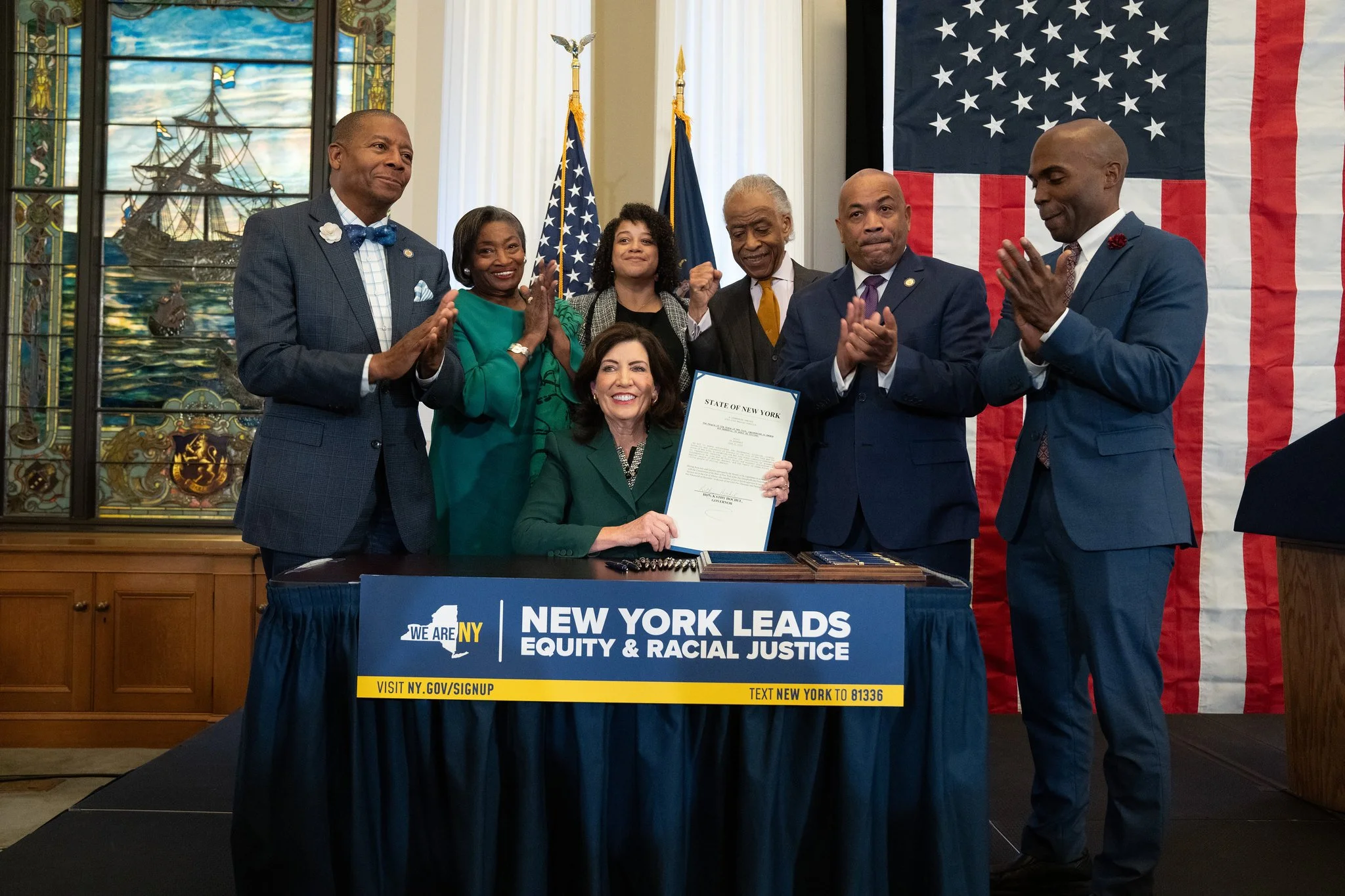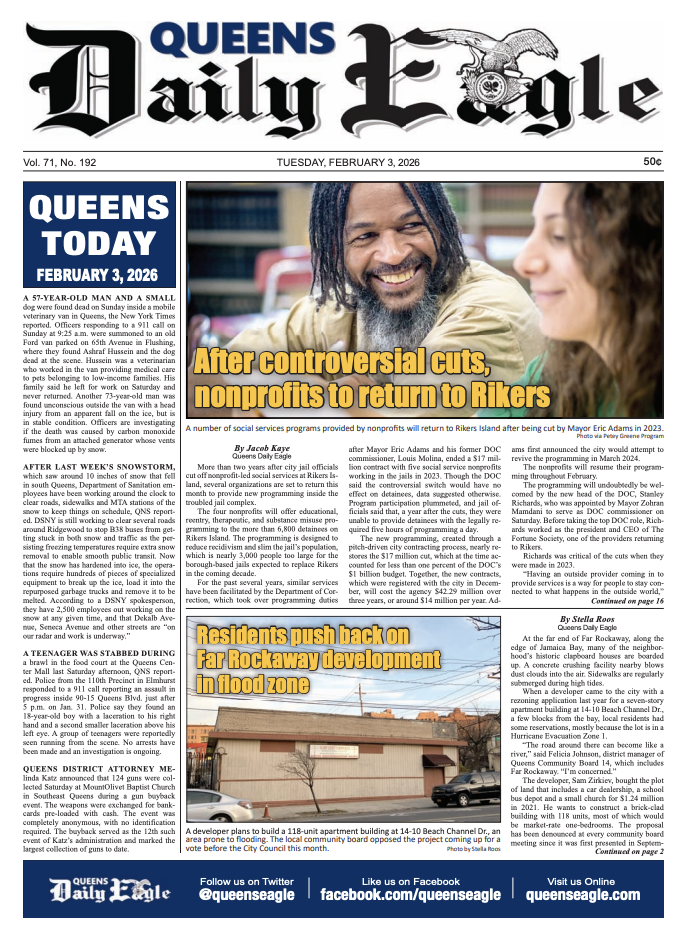Gov signs Queens pol’s reparations bill into law
/Governor Kathy Hochul signed into law Tuesday a bill which will establish a commission to look into the possibility of reparations for slavery in New York State. Photo via the office of Governor Kathy Hochul
By Ryan Schwach
Governor Kathy Hochul signed a Queens lawmaker’s bill into law on Tuesday, establishing a commission to study reparations, and New York’s position in the history of slavery and racial injustice in America.
The legislation was sponsored by Queens State Senator James Sanders and seeks to examine New York’s role in the slave trade and the historical racial injustices that have reverberated through time and still exist today.
While the commission is empowered to study and recommend potential restitutions, including cash payments, it’s too early to say whether or not those recommendations will be put forth by the group.
Regardless, the governor said on Tuesday that it’s past time New Yorkers confront their state’s role in the grotesque history of slavery in the United States.
“New York has long been the center of American commerce, Wall Street, banking, shipping, insurance, the economic engines of our entire country, and they thrived because they can trade in commodities that were produced by slaves,” Hochul said during the bill signing.
Despite New York’s work against slavery even before the Civil War broke out, outlawing the trade several decades before the nation did, New York still had a role in the national atrocity, including a slave market at Wall Street.
“We can say we’re the heroes, we were the ones who fought against slavery, and indeed many did,” said Hochul. “What is hard to embrace is the fact that our state also flourished from that slavery. It's not a beautiful story, but indeed it is the truth.”
“I challenge all New Yorkers to be patriots and rebuke and not excuse our role in benefiting from the institution of slavery,” Hochul added.
Hesitancy toward reparations in the United States – on top of the potential cost – have come from those who say that because slavery is a thing of the past, Americans are no longer affected by it. The governor and the bill’s allies looked to dispel that idea on Tuesday.
“I'm not sure people really understand the true history of slavery,” said Assembly Speaker Carl Heastie. “Sometimes people think it ended in 1865 and there was nothing else, and we just fast forward to today, and everybody's equal, but that's not the case at all. When you look at slavery…it contributes to today's criminal justice system, to all inequities.”
Hochul spoke of the “generations” of racism and disenfranchisement faced by Black Americans.
“Black and brown Americans in segregated cities sometimes choked with dirty air,” she said. “Black Americans are still oppressed by elevated rates of poverty, death, disease, illness, suffering the highest rates of infant child and maternal mortality…descendants of slaves still lagging behind white families in attaining generational wealth, homeownership and higher education.”
These inequities are all too familiar to the representatives who pushed the bill, many of whom represent chiefly Black communities.
“Every time we go back home and we look in our communities, particularly those of us who represent communities of color, we get reminded everyday that it's not over and that the struggle continues,” said Heastie.
“Black communities endure the same injustice through policy that cannot be erased and our history is stained and systematic racism,” added Assemblymember Michaelle Solages, who sponsored the Assembly version of the bill.
For Sanders, who sponsored the bill in the Senate, the legislation is about the prospect of equalizing the playing field for Black New Yorkers.
“That's what we're fighting for today,” he said. “The equality of opportunity, just everybody at the same place, the same starting field.”
The bill specifically establishes the commission, which will have the job to examine the past and lasting harms that the slave trade and racial inequality had and continues to have on Black New Yorkers. The commission will also establish ways in which those harms can be remedied.
“This bill makes it possible to have a conversation, a reasoned debate,” said Hochul.
The text of the bill states that those remedies could include laws, policies, programs and projects, which could include direct financial compensation.
The commission will be made of nine individuals, each of whom will be appointed in the next 90 days.
Hochul, Heastie and Stewart-Cousins will each appoint three members to the commission.
Though the bill was passed by the legislature and has many supporters, it is expected to be a controversial one – even proponents of the bill expect it to draw ire and hesitation.
“There will be pushback,” Stewart-Cousins said. “But our ancestors have pushed forward so that we could be here at this moment.”
Not long after the bill was signed, State Senate Republican Leader Rob Ortt issued a statement claiming a commission isn’t needed.
“The reparations of slavery were paid with the blood and lives of hundreds of thousands of Americans who fought to end slavery during the Civil War,” he said. “A divisive commission to consider reparations is unworkable. As we’ve seen in California, I am confident this commission's recommendations will be unrealistic, will come at an astronomical cost to all New Yorkers, and will only further divide our state.”
Ortt also suggested an alternative: directing money toward education, rather than reparations.
“Instead of advancing a costly and divisive commission, we should direct our resources to places like the Niagara Falls Underground Railroad Heritage Center, which educates the public about our history and brings our community together,” his statement read.
The commission will release a report based on its findings around one year after it is fully appointed and begins to meet.




